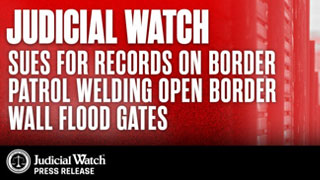

FDIC Documents Indicate Treasury May Have Improperly Pressured Independent FDIC to Accept Bailout Deal
Judicial Watch, the public interest group that investigates and prosecutes government corruption, announced today that an analysis of Federal Deposit Insurance Corporation (FDIC) documents indicates that officials from the Department of Treasury may have improperly pressured the independent FDIC to accept the bailout deal. Judicial Watch has pursued these FDIC documents, released in conjunction with a Financial Crisis Inquiry Commission investigation, for more than a year on behalf of former FDIC employee Vern McKinley. The documents are the subject of a Freedom of Information Act lawsuit (McKinley v. Federal Deposit Insurance Corporation, et al., (No. 09-01263 (ESH)).
According to the transcript of the meeting of the FDIC Board of Directors on September 29, 2008, Chairman Sheila Bair indicated on the bailout of Wachovia that she “acquiesced” to pressure from Treasury which was “vigorously pushing” the bailout plan. “I’m not completely comfortable with it but we need to move forward with something,” Chairman Bair said. The FDIC is an independent agency of the federal government that is supposed to insulate itself from political pressure brought by other government agencies, including Treasury.
Judicial Watch’s analysis of the documents also indicates that, despite apparently lacking any legal authority to do so, Treasury agreed to cover any losses associated with the Wachovia transaction. This bailout was in September 2008, before Congress established Treasury’s authority under TARP in October 2008.
According to minutes of a meeting of the FDIC Board on September 29, 2008, “[FDIC Board] Chairman Bair then added that the Department of the Treasury has already agreed that, if there are any losses attendant with the transaction, it will separately fund those so that the Corporation’s cash balance would not be depleted in any way. She said that this was in contrast to the Department of Treasury’s usual rule that the Corporation must spend down its entire cash balance before the Corporation can borrow from the Treasury.”
Treasury may cover losses in a transaction only when granted the proper legal authority by Congress.
The FDIC documents also indicate that the federal government, while noting some concerns about Wachovia Bank’s policies and procedures, granted the Wachovia holding company and bank a passing grade in multiple assessments just prior to the bailout. For example:
- An August 4, 2008 “Report of Examination” of Wachovia by the Comptroller of the Currency concluded “At this time, capital is rated a ‘2’ and the bank is within the ‘well capitalized’ level for Prompt Corrective Action (PCA) purposes. Wachovia’s capital levels are projected to remain adequate through year-end 2008 and into 2009.” Overall, Wachovia earned a “3” rating on a scale of 1 to 5 with 1 indicating an “outstanding” rating. (See page 45 – 46 of the FDIC documents.)
- Moreover, according to a July 22, 2008 assessment by the Federal Reserve, Wachovia earned a “3” rating, or “fair.” According to this assessment the Federal Reserve concluded “…the risk management and financial capacity of the company…pose only a remote threat to its continued viability.” (See page 9 of the FDIC documents.)
“These FDIC documents certainly raise more questions than they answer,” said Judicial Watch President Tom Fitton. “Did Treasury bully the FDIC the same way former Secretary Paulson forced banks to accept the government ‘investments’? How on earth could government officials give Wachovia a ‘fair’ grade just weeks before it melted down in need of a FDIC bailout? And under what authority did Treasury act to so obtrusively interfere with the private sector in the first place? The only way we’ll ever find these answers is if the Obama administration stops stonewalling and releases bailout documents as required by law.”














